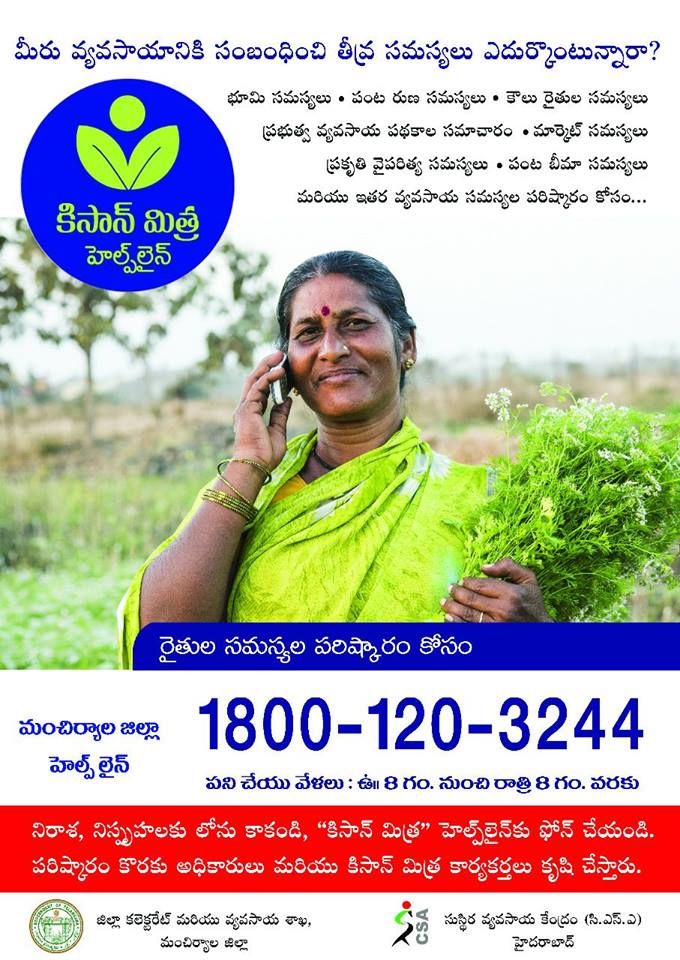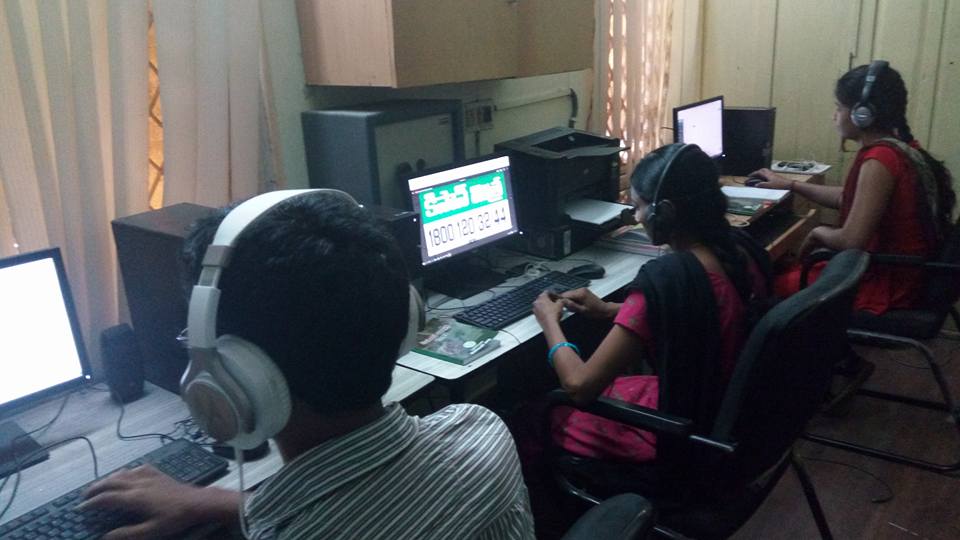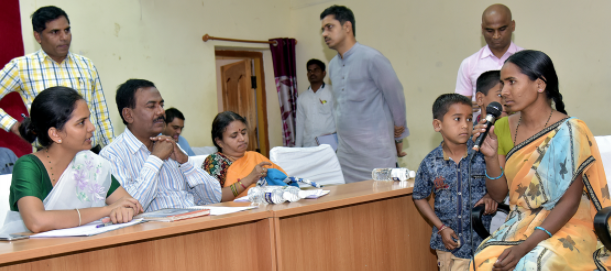Mallappa from Tattepalle, Vikarabad district, Telangana, called on Kisan Mitra helpline multiple times expressing anguish and distress, on 17th May 2018 evening around 5 PM, when things reached a state of desperation, he said he would commit suicide. Mallappa’s younger daughter’s treatment costs a lot of money while the elder daughter does not have a job. On the one hand the bank loan needs to be paid off, but on the other hand, he lacks capital for his sugarcane crop. With no drip irrigation and faulty land records were compounding his problems. All these problems were deeply disturbing him and his family. Mallappa’s story is just the tip of the iceberg.
Every few days we hear many distressing news of farmer suicides. What is causing farmers across rural belt in India to commit suicide? Is it the farm distress? Has agriculture become so unsustainable that farmers see no other way out? Are we there for our farmers? There are several such questions which troubled
Center for Sustainable Agriculture(CSA) and they decided to take concrete action through
Kisan Mitra Helpline.

How is Kisan Mitra helpline different from others?
There are several helplines where farmers can call in, but most of them are just related to technical agricultural questions. What our farmers need is someone who listens to their problems and helps them by directing them to the right people for a solution. Kisan Mitra helpline is just that and much more. Mr Harsha from Kisan Mitra’s core team says “Understanding rural distress and issues and attempting to solve them one issue at a time, as well as making wider policy corrections has shaped what Kisan Mitra is today”.
 Kisan Mitra helpline centre
Kisan Mitra helpline centre
Kisan Mitra Helpline was set up to understand the problems faced by farmers of Vikarabad district in the state of Telangana and to reduce farmers distress. Vikarabad is one of the backward areas in Telangana state. This helpline was launched on the occasion of Dr.B.R.Ambedkar Jayanti, on 14th April 2017 by Centre for Sustainable Agriculture with the support from the district administration, Vikarabad.

The district administration has made the Agriculture Department the nodal agency responsible for coordinating the complete process of this helpline with the help of all related departments at the district level. Centre for Sustainable Agriculture takes the lead in the running the Kisan Mitra helpline and handling of farmer’s distress calls. A team of five people have been appointed to manage the incoming calls, and one individual was appointed to oversee field-level coordination and interactions with farmers.
Talking to The Logical Indian, the Vikarabad district collector M/s Divya Devaraju explains the ideation and execution of Kisan Mitra. She says, “ Kisan Mitra is an outcome of a brainstorming session one day in Vikarabad Collectorate with different stakeholders working on farmer suicides. It was felt that we are often reacting to farmer’s problems after they occur. Distress doesn’t occur in a day. A small land record issue here, a bank loan issue there, availability of subsidised seed elsewhere are often left unattended to, which lead to piling up of issues and finally distress. Hence we thought can we proactively track the problems of farmers and solve them by taking to a logical conclusion. This was the birth of the idea of Kisan Mitra. Govt Order Ms 421 of the State Government in 2004 stipulated that there should be a farmer distress helpline in every collectorate. We simply took the mandatory requirement of the helpline and tried to make it more comprehensive. It is also an effort to make all stakeholder departments like revenue (land), agriculture, banking, electricity, agriculture marketing etc., aware of the issues of the farmers and work in tandem towards a solution.”
 Vikarabad, collector Divta Devarajan interacting with one of the farmers family members who took his life.
Vikarabad, collector Divta Devarajan interacting with one of the farmers family members who took his life.
Centre for Sustainable Agriculture and Kisan Mitra’s team launched an awareness campaign which included flyers, posters, events such as suicide prevention week etc., while the agriculture department took up the initiative of wall writings in every mandal office to create and raise awareness among farmers and their family members. In addition to this, the field coordinator also visited many villages personally to interact with the community and distribute pamphlets and flyers about Kisan Mitra. The Kisan Mitra team and the district administration also reached out to various local print media outlets to reach a broader audience.
As of March 30, 2018, Kisan Mitra has worked on 3,022 cases in Vikarabad district. 740 of these cases were from farmers seeking information related to agriculture requiring technical knowledge and were diverted to the Kisan Call Centre(the govt helpline) and the Agricultural department. The remaining 2,282 of cases were from farmers with issues regarding non-agricultural matters requiring more considerable intervention or attention from the different government departments amongst other interventions. Kisan Mitra also beganoperations in Adilabad district a couple of months ago. Since inception, they have tackled 289 cases. 216 cases were issues that needed intervention. They have also started operations in Mancherial from 29th March 2018.
Coming back to Mallappa’s case, Kisan Mitra sent their field coordinator Sangameshwar to visit the farmer within 2 hours.They met the farmer at the MRO office directly so that his grievances can be taken to the MRO instantly. In addition to this, Sangameshwar also visited the family and collected further details of the distress and reported it back to Kisan Mitra team on the same day. Kisan Mitra team then immediately swung into action and sent emails and SMSes to the district collector and other administrators the very next day.
Peddemul’s Mandal Revenue Officer (Tahsildar) responded immediately and called Kisan Mitra Field coordinator to the office to understand the issues that the farmer was facing and planned for a swift action on 18th May and by 19th morning, the farmer his family members were given the modified land record copies. Peddemul Horticulture officer invited the family members and oversaw the application process for Drip irrigation end to end. Following this, on 20th May, Sub-collector invited the Malanna, MRO and Kisan Mitra Field Coordinator and his daughter who had finished her degree and she was given a job locally.
Malanna received timely help, he has gathered strength and is now determined to solve his long-term issues and move ahead in life. The fact that someone cared brought him back from the brink of death and gave a new lease of life to his family. Mallappa says “ I am alive today only because of Kisan Mitra. The fact that they were there for me and gave me the courage to face difficulties, and in the future also I am ready to fight all the difficulties”. Kisan Mitra is still helping him in negotiating and dealing with his long-term problems.
Mr Doma Srinivas of Doma village says that he cannot imagine his life without Kisan Mitra. “Kisan Mitra not only saved my father’s life and gave me hope but also showed me a path forward in life,” he says. Mr Doma Srinivas was working odd jobs in another town when he was informed that his father had announced his intention to end his life in a local kisan sabha. By this time they were facing several financial difficulties as a family.
Agriculture was not proving to be a sustainable way of life for them. They had crop loans, and the bank was not helping them as colossal interest had accrued. Mr Srinivas read in the paper about Kisan Mitra and approached them. Kisan Mitra’s team reached out and gave confidence to his father. In addition to this, they also helped by training him to be a field coordinator so that he can take care of his family members as well as help other farmers and their families. Mr Srinivas is negotiating with the bank for a one-time settlement and is hopeful of a good life ahead.
Kisan Mitra has helped several families like this in a very short span of time. What is remarkable about the team of Kisan Mitra, the support staff, district administration and the Centre for Sustainable Agriculture is that they are incredibly committed, passionate and caring. They are not just looking for immediate relief but long-term results. They are meeting farmers to understand the problems that they are facing with crop insurance, crop loans and the NREGA money that has not reached them. It doesn’t stop here, they are also looking to get as much help as possible for the upkeeping the mental health of the farmers so that they can deal with stress. They are making sure farmers are ‘heard’ and that farmers’ lives indeed matter. In Mr Harsha’s words “Next phase of Kisan Mitra is about collaborating with people/communities across the country in understanding local Issues, sharing them to a wider audience and understand from different experiences on diverse ways of solving them.”